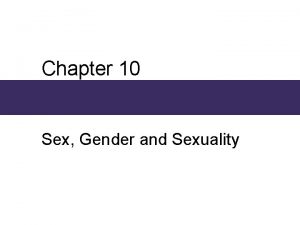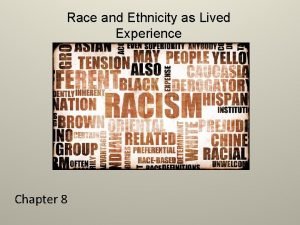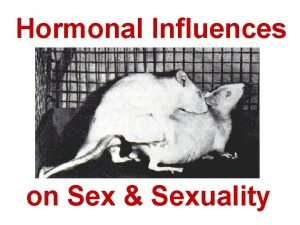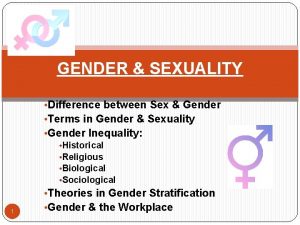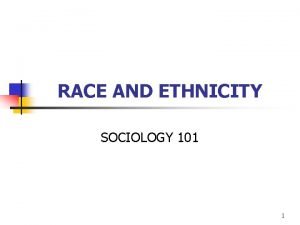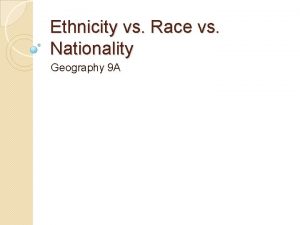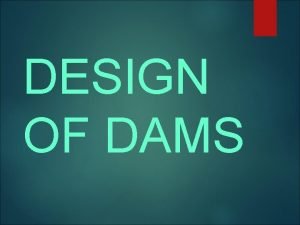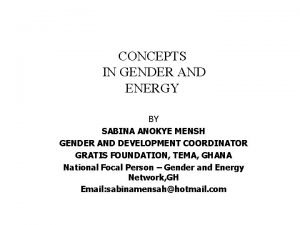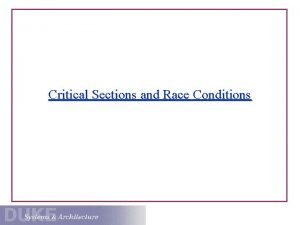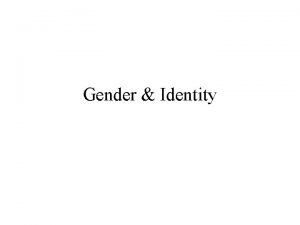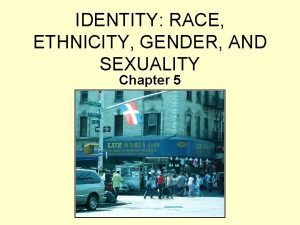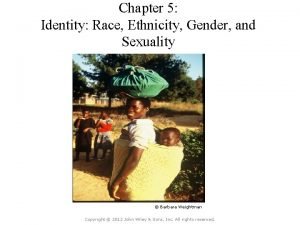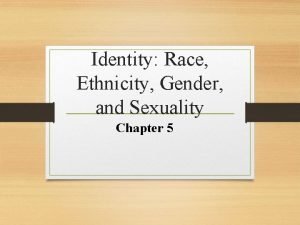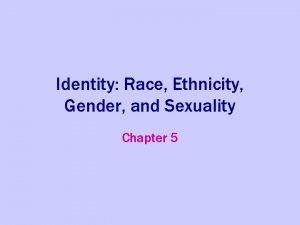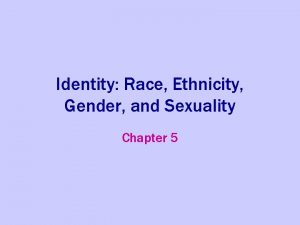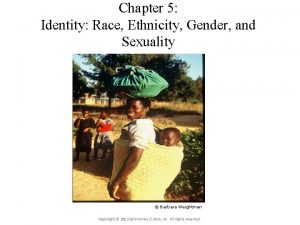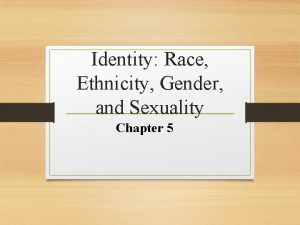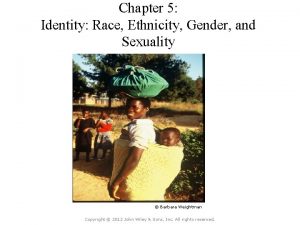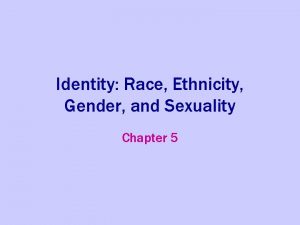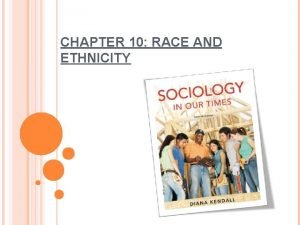Chapter 5 Identity Race Ethnicity Gender and Sexuality






![Weber’s definition of ethnicity: [T]hose human groups that entertain Ethnicity: a constructed identity that Weber’s definition of ethnicity: [T]hose human groups that entertain Ethnicity: a constructed identity that](https://slidetodoc.com/presentation_image_h2/f9dc85b8a3c39470f61d0d44d7f45638/image-7.jpg)





- Slides: 12

Chapter 5 Identity: Race, Ethnicity, Gender, and Sexuality

• To be able to understand explain how our identities are socially constructed • To appreciate that there is no scientific basis for racial or gender distinctions • To be able to understand that ethnic groupings are also problematic and have no scientific basis • To be able to understand that racism and sexism still exists and therefore must be studied Objectives

According to Geographer Gillian Rose, identity is: u we construct our identities through experiences, emotions connections, and rejections. “How we make sense of ourselves? ” u An identity is a snapshot of who we are at a point in time u Identities are fluid, constantly changing, shifting, becoming. u Identities vary across scales, and affect each other across scales. u Identities are also constructed by identifying against (defining the other and then defining ourselves as “not that. ”) What is Identity?

How can we see identity in places? Space – “social relations stretched out” Place – “particular articulations of those social relations as they have come together, over time, in that particular location. ” (Massey and Jess) Sense of place: where we infuse meaning and feeling, with memories and emotions • Our sense of place becomes part of our identity, and our identity in turn, affects the way we experience place • When people make places, they do so in the context of surrounding social relationships. Identity, Space and Place

• a categorization of humans based on skin color and other physical characteristics. • Jonathan Marks (UNCC) study identified how y the 1970 s, it had become clear that most human differences were • cultural; Racial categories are social and political constructions Wait…. if Race anthropologists and exist, geneticists that race as the previous doesn’t generation had known it – as largely discrete, geographically distinct, are gene pools – DID NOT EXIST. then why we always talking about it? because they are based on ideas that some biological differencesaare more important others. • Consequently consensus developedthan among What is Race?

• Racial Categories are typically imposed on people through: • Residential segregation • Racialized divisions of labor • Racial categories defined by governments Racism does exist
![Webers definition of ethnicity Those human groups that entertain Ethnicity a constructed identity that Weber’s definition of ethnicity: [T]hose human groups that entertain Ethnicity: a constructed identity that](https://slidetodoc.com/presentation_image_h2/f9dc85b8a3c39470f61d0d44d7f45638/image-7.jpg)
Weber’s definition of ethnicity: [T]hose human groups that entertain Ethnicity: a constructed identity that is tied a to a place … it is often considered because it descent implies ancient subjective belief “natural” in their common relations people over becauseamong of similarities oftime. physical type or of customs or both, or because of memories of • colonization Sociologist Max once remarked thatmust be and. Weber migration; this belief "the whole conception ethnic groups is so complex important for group of formation; furthermore it and so vague it might be goodan to objective abandon it blood altogether. ” does notthat matter whether relationship exists. Ethnicity

Gender – “a culture’s assumptions about the differences between men and women: their ‘characters, ’ the roles they play in society, what they represent. ” - Domosh and Seager Gendered Spaces: spaces or buildings can be gendered by design or by the way they are used Gender & Space

Issues that Geographers are interested in…. • What are the differences in gender inequality in the developed and developing world? • Why is their a longevity gap? What affects it? • What is the relationship between affluence and lifestyle choices? • Why does unpaid work go unnoticed literally and economically? • How do power relationships lead to disempowerment of women? Gender Inequality

• Cultures decide what is “normal” sexually. Issues that Geographers are interested in: • Geographers Elder, Knopp & Nast argue that most u Whatscience factors affect sexuality beyond the heteronormative? social is written in a heteronormative way. u Where do people with a shared sexual identity cluster? How do What does this mean for studies on sexuality, they define and influence their space and place? What shared space & place? problems or celebrations do they have? u Exploring the concept of Queer Theory the idea that a once negative term, is now being a more empowering • Their studies explore how used localincultures, global sense to describe oppositionpolitics to the heteronormative, and political diffusion of cultures, etc. also affect the engagement of those who oppose it/do not identify with it sexual identities of people u The patterns of same-sex households and their impact on neighbourhoods u The impact of Power relationships on sexual identity: government policies and practices that promote or subjugate groups of people Sexuality & Space

u we construct our identities through experiences, emotions connections, and rejections. u An identity is a snapshot of who we are at a point in time u Identities are fluid, constantly changing, shifting, becoming. u Identities vary across scales, and affect each other across scales. u Identities are also constructed by identifying against (defining the other and then defining ourselves as “not that. ”) • Choose one of the above statements and write a response about how your personal identity has developed/is developing (15 minutes) Reflect on your Identity

For Tuesday 1. Read Chapter 4 or 5 and take notes (quiz on both chapters will be on Tuesday). For Thursday 2. Visit the 100 Women Conference page at http: //www. bbc. co. uk/news/world-24371433 Choose one article or video and read/watch. Write a response to this piece with your thoughts, feelings, questions, concerns etc. 3. Take the Project Implicit test at https: //implicit. harvard. edu/implicit/demo/ Register, then click on the education tab to read about the study. Then click on “take a test”. Take either one or all of the following: Gender-career test, Sexuality test, Race test Get your results and be prepared to discuss! Homework
 Chapter 10 sex gender and sexuality
Chapter 10 sex gender and sexuality Chapter 8: race and ethnicity as lived experience
Chapter 8: race and ethnicity as lived experience Sex gender and sexuality
Sex gender and sexuality What is talcott parsons structural functionalism
What is talcott parsons structural functionalism What is cultural assimilation
What is cultural assimilation Race vs ethnicity vs nationality
Race vs ethnicity vs nationality Efficiency of pelton turbine
Efficiency of pelton turbine A solid barrier constructed at a suitable location
A solid barrier constructed at a suitable location Strategic gender needs and practical gender needs
Strategic gender needs and practical gender needs Data race vs race condition
Data race vs race condition Gender-role development
Gender-role development Sexual orientation gender identity
Sexual orientation gender identity Gender identity
Gender identity
